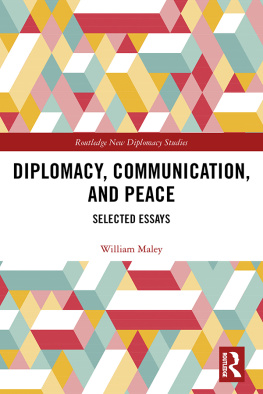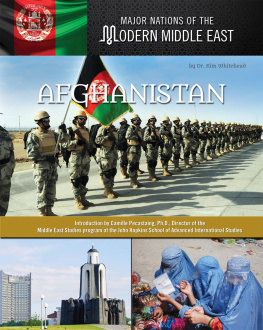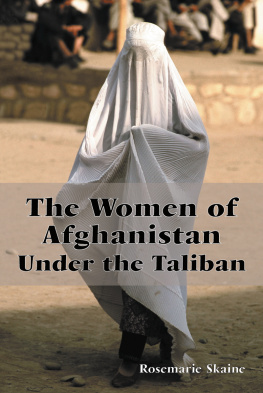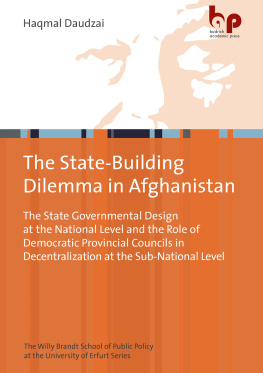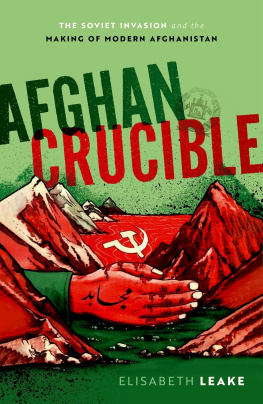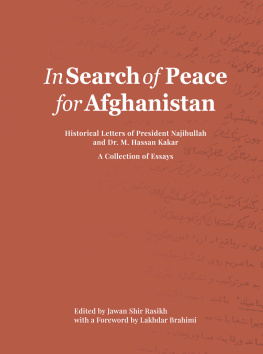
Transition in Afghanistan
This book, by one of the most experienced authorities on the subject, presents a deep analysis of the very difficult current situation in Afghanistan. Covering a wide range of important subjects including state-building, democracy, war, the rule of law, and international relations, the book draws out two overarching key factors: the way in which the prevailing neopatrimonial political order has become entrenched, making it very difficult for any other political order to take root; and the hostile region in which Afghanistan is located, especially the way in which an ongoing creeping invasion from Pakistani territory has compromised the aspirations of both the Afghan government and its international backers to move the country to a more stable position.
William Maley is Professor of Diplomacy, Asia-Pacific College of Diplomacy, The Australian National University
Durham Modern Middle East and Islamic World Series
Series Editor: Anoushiravan Ehteshami, University of Durham
For a full list of available titles please visit: https://www.routledge.com/Durham-Modern-Middle-East-and-Islamic-World-Series/book-series/SE0526
37. Islamism and Globalisation in Jordan
Daniel Atzori
38. The Military in Post-Revolutionary Iran
The Evolution and Roles of the Revolutionary Guards
Hesam Forozan
39. Moroccan Foreign Policy under Mohammed VI, 1999-2014
Irene Fernndez Molina
40. Lebanon and the Arab Uprisings
In the Eye of the Hurricane
Edited by Maximilian Felsch and Martin Whlisch
41. The Erasure of Arab Political Identity
Colonialism and Violence
by Salam Hawa
42. China's Presence in the Middle East
The Implications of the One Belt, One Road Initiative
Edited by Anoushiravan Ehteshami and Niv Horesh
43. Afghanistan - Challenges and Prospects
Edited by Srinjoy Bose, Nishank Motwani and William Maley
44. Nuclear Politics in Asia
Edited by Marzieh Kouhi Esfahani and Ariabarzan Mohammadi
45. Transition in Afghanistan
Hope, Despair and the Limits of Statebuilding
By William Maley
46. Russias Middle East Policy
From Lenin to Putin
By Alexey Vasiliev
Transition in Afghanistan
Hope, Despair and the Limits of Statebuilding
William Maley
First published 2018
by Routledge
2 Park Square, Milton Park, Abingdon, Oxon OX14 4RN
and by Routledge
711 Third Avenue, New York, NY 10017
Routledge is an imprint of the Taylor & Francis Group, an informa business
2018 William Maley
The right of William Maley to be identified as author of this work has been asserted by him in accordance with sections 77 and 78 of the Copyright, Designs and Patents Act 1988.
All rights reserved. No part of this book may be reprinted or reproduced or utilised in any form or by any electronic, mechanical, or other means, now known or hereafter invented, including photocopying and recording, or in any information storage or retrieval system, without permission in writing from the publishers.
Trademark notice: Product or corporate names may be trademarks or registered trademarks, and are used only for identification and explanation without intent to infringe.
British Library Cataloguing in Publication Data
A catalogue record for this book is available from the British Library
Library of Congress Cataloging in Publication Data
Names: Maley, William, 1957- author.
Title: Transition in Afghanistan : hope, despair and the limits of statebuilding / William Maley.
Other titles: Durham modern Middle East and Islamic world series ; 45.
Description: Milton Park, Abingdon, Oxon : Routledge, 2018. | Series: Durham modern Middle East and Islamic world series ; 45 | Includes bibliographical references and index.
Identifiers: LCCN 2017051111| ISBN 9781138308718 (hardback) | ISBN 9780203866467 (ebook)
Subjects: LCSH: Nation-building-Afghanistan. | Afghanistan-Politics and government-2001- | Postwar reconstruction-Afghanistan. | Democracy-Afghanistan. | Elections-Afghanistan. | Rule of law-Afghanistan. | Human rights-Afghanistan. | Afghanistan-Foreign relations-2001-
Classification: LCC DS371.4 .M353 2018 | DDC 958.104/7-dc23
LC record available at https://lccn.loc.gov/2017051111
ISBN: 9781138308718 (hbk)
ISBN: 9781315143071 (ebk)
For David Savage, AM
On 26 March 2012, David Savage, a greatly-loved Australian civilian aid worker, was severely injured by a suicide bomber in Uruzgan.
On 26 March 2017, the 5th anniversary of the attack, he posted the following words on Facebook: There is another victim that no one talks about, but I often think of him, and that is the poor illiterate 12 year old boy who was sacrificed by the Taliban to attack us. I hope he is in a better place.
These words explain why David Savage remains an inspiration to all who know him.

Wednesday 31 May 2017 was a beautiful Spring day in the Afghan capital Kabul. As usual, by early morning large numbers of Afghans had taken to cars, taxis and bicycles to get to work. But many never made it to their destinations. At around 8.30 am, approximately 1500 kilograms of explosives were detonated by a suicide bomber who had stopped his vehicle not far from the German Embassy in Wazir Akbar Khan. The blast smashed the buildings in its immediate vicinity, destroyed fifty cars, and shattered windows all the way from Great Massoud Square to the Haji Yaqub mosque in the neighbouring suburb of Shahr-e Naw. When the smoke and dust began to clear, they revealed a scene of utter devastation, a charnel house for the rescuers. More than ninety people were killed, and nearly five hundred injured.1 The vast majority of the victims, unprotected by the blast barriers that allegedly made Wazir Akbar Khan one of the safest parts of the city, were ordinary Afghans going about their daily business. The attack produced an atmosphere of boiling anger in Kabul, and two days later, as protestors marched towards the Presidential Palace, five were shot dead and fifteen wounded by security guards.2 As funerals of these victims took place in Khair Khana the following day, three more bombs went off, killing fifteen mourners and injuring many more.3
It was not intended to be anything like this when following the US overthrow of the repressive Taliban regime that had hosted Osama Bin Ladens al-Qaeda movement non-Taliban Afghan delegates endorsed an agreement in the German city of Bonn on 5 December 2001 providing for transition to new political arrangements. Hope, not despair, was the prevailing emotion. For many Afghans, Afghanistan under the Taliban regime had hit rock bottom, and the only way the country could go was up. Yet by 2017, there was not much hope left. A survey conducted in Afghanistan in 2017 by The Asia Foundation found that although 80 per cent of respondents had no sympathy at all for the Taliban, only 33 per cent felt that things were moving in the right direction, while 61 per cent took the view that things were moving in the wrong direction.4 Furthermore, after witnessing extensive electoral fraud in the 2014 presidential poll,5 many Afghans in 2015 opted to vote with their feet, making up one of the largest contingents seeking asylum in Europe.6 For many Afghans, hope seems to have given way to despair. The aim of this book is to explore some of the crucial factors that account for this slide. It is not a jeremiad or quasi-jeremiad, in part because there are a number of these already, some of them extremely insightful.7 But it is not a jeremiad for a deeper reason as well. Afghanistans transition remains a work in progress, albeit on a knife-edge.8 The situation in Afghanistan is extremely grave but not unsalvageable, and there are policy options available that could help address some of its problems. Whether they will actually be pursued is a different question, but it would be premature simply to abandon all hope, and more seriously, to abandon the ordinary people of Afghanistan. They have been abandoned several times in the recent past, and rarely to the benefit of those who have chosen to turn their backs and walk away.


